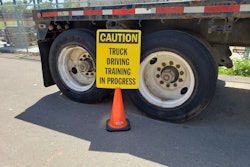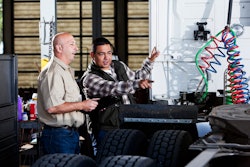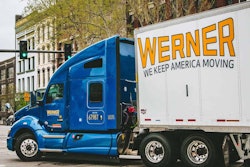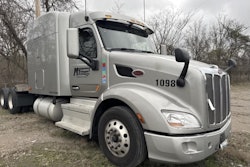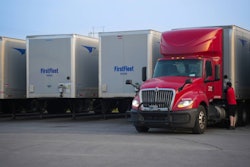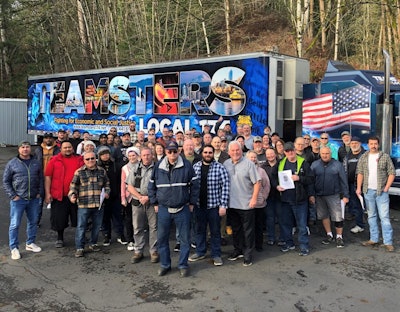
The year 2023 was marked by labor flexing its muscle, resulting in wage-gaining strikes by the Screen Actors Guild, the Writers Guild of America, and the United Auto Workers, to name a few. Unionization efforts also garnered headlines at iconic outlets like Starbucks and Amazon, which have aggressively fended off previous efforts.
Even with these wins, union membership in the United States is still down from its peak in 1950 when, according to the United States Department of Treasury, about 35% of all workers were in unions. The unionized share of the workforce has declined steadily since to 10% in 2022. Some professions, even during the peak period, have historically been out of reach of most unions. Trucking is one of those professions in which unions have had difficulty gaining a foothold.
But with some of labor's recent wins and a tight job market that has given workers more leverage, is trucking finally ripe for a wave of unionization?
[Related: Drivers at three 10 Roads Express terminals vote to unionize]
Most analysts say that trucking, especially over-the-road (OTR), has unique DNA and tricky logistical and cultural characteristics, making it a challenging terrain for unions. And these challenges are not expected to disappear for the foreseeable future.
One of the biggest impediments to unionization is the nature of the profession.
"Truckers are out on the road by themselves, so the ability to organize is limited," said Avery Vise, vice president of trucking at FTR. He said efforts to unionize OTR truckers simply aren't going to gain traction. "We will see successes here and there, but I would be surprised to see any of the large carriers unionized."
The exception is LTL drivers who congregate at terminals, Vise said, making unionization drives easier. The Teamsters represented all of Yellow Trucking's 20,000-plus drivers, but Yellow's collapse may have left an already union-averse profession even more skittish.
'Leave us alone'
"The union were the ones that destroyed and sunk Yellow completely. The union is why," said Bob Sorin, who hauls for Werner Enterprises (CCJ Top 250, No. 13) in Springfield, Ohio.
Sorin says there was a lot of chatter about Yellow among OTR drivers at truck stops and that almost everyone shared his sentiment: that the union contributed to the iconic carrier's closure in 2023.
Sorin hauls everything and anything, but lately, his loads have been animal feed and dog food on dedicated routes throughout the Midwest.
"Unions end up killing businesses more than they help. To me, they do more harm than good," Morin said, adding that if he ever has a complaint, there are plenty of ways to address them within his company. "They take very good care of me, they get me home when I need to be. I can't complain,."
Morin said many OTR truckers wouldn't want the added layer of a union to deal with, even if there were some benefits.
"A lot of truckers say 'give us our loads, we know what we are doing, let us do our jobs and leave us alone,'" Morin said.
Still, 26 drivers at Werner subsidiary ECM in New Jersey did unionize in August last year and are represented by the United Food and Commercial Workers (UFCW). Mike Thompson is the vice president and is in charge of organizing for UFCW Local 152, which the ECM workers joined. Thompson said this is the first group of truckers he has organized and that unions for truckers are the same as for any worker, giving them a voice at the negotiating table. But for unions to catch on in trucking, it has to be an organic movement from within. It won't come from the Teamsters or UFCW organizing them.
"At the end of the day, workers have to want it," Thompson said. And many don't.
Backwards protections
 Members of Teamsters Local 100 in December went on strike against DHL Express at Cincinnati/Northern Kentucky International Airport (CVG) and expanded picket lines to numerous locations nationwide.Teamsters
Members of Teamsters Local 100 in December went on strike against DHL Express at Cincinnati/Northern Kentucky International Airport (CVG) and expanded picket lines to numerous locations nationwide.Teamsters
Chris Lauwers drives a flatbed for Building Systems Transportation in London, Ohio. Lauwers has driven OTR for five years and has little use for unions.
"It is very competitive. Workers have a lot of options; if you are not treating them well, then they can go elsewhere," Lauwers said, adding that a union seems like a decent idea on paper, but in practice – at least in trucking – unionization causes more problems than it prevents.
"A union makes newer people coming in un-fireable, and the real people you end up protecting are the ones you don't want on the road," Lauwers said.
If a driver is caught doing something they shouldn't, Lauwers said the unions may save someone's job that shouldn't be saved.
Even on the pay issue, Lauwers echoed what others say: there isn't much margin to work with.
"With unions and collective bargaining, the companies have to pay more and, as a driver, I appreciate higher pay," Lauwers said. But with a saturated market and everyone undercutting everyone else, higher pay would be good for the drivers, but then there is no money left for trucks and their upkeep and maintenance. So, the only thing to do is to raise rates.
"But you can't do that because the minute you raise rates, UPS or FedEx or someone else will come in to undercut. It is just a really competitive and cutthroat business," Lauwers said. As an OTR driver, he is sent everywhere, generally regionally, but has been to all lower 48 states. For him, the unions are less about the trucking mindset of wanting to be left alone and more about not having room for them. But he agrees that some truckers have a "want to be left alone" mentality.
"We like to stay away from a lot of drama," Lauwers said. "I work for a great company, so a union isn't needed. If have to take off because of a family issue, they say `fine,' and if the delivery is a day late, it's a day late."
While FTR's Vise said unions can help negotiate higher wages, he agrees with Lauwers about having little wiggle room. Wages in trucking are already responsive to market forces that boost trucker pay, so the union's impact is muted.
"The market responds quickly to pressures, so wage growth in trucking is greater than you have in most other segments," Vise said. "Wages are a function not just of pay rate but utilization. In trucking, you can get more miles in a tight market. When things get tight, rates go up."
Vise also points out that OTR drivers are spread throughout the country, even if they work for the same company. An LTL carrier based in a single city will have most workers in the same geographical area, giving them more unionization leverage.
Also, Vise said the OTR profession often attracts leave-me-alone libertarians and anti-union types who don't want to be organized or part of a group, which is why they are OTR drivers in the first place: a largely solitary profession, echoing Morin's mantra of "just leave us alone."
That sentiment is shared by Travis Roberts, owner of Regen Truck Driving School, which has five campuses in Michigan, where unions are strong.
"Truckers are a unique bunch. Many of them just don't want to be part of a union," Roberts said, adding that if the company treats the driver well, most OTRs won't consider a union.
Roberts himself has "very mixed" feelings about unions in trucking. He said that unions can help push back against drivers driving more than they should and improve trucker working conditions if they aren't up to par. Still, unions can sometimes exact an economic price that trucking companies can't afford.
"Unions can make salaries go up, which drives up costs, which they can't afford, and they go under," Roberts said. "So unions are a double-edged sword."
Blood on union hands
Kenny Veith, president of ACT Research, said that unions can run counter to one of trucking's main characteristics: flexibility.
"Unions provide security for labor, but they reduce system flexibility in freight markets, and being the most successful requires a great deal of flexibility," he said. Vieth also agrees that the Teamster's involvement in Yellow Corp. and its demise may sour additional union attempts.
The Teamsters themselves are vowing to continue efforts to unionize truckers, even in the wake of nearly 100-year-old Yellow's collapse and the union's role in it, because of the benefits they say unionization brings to drivers.
[Related: Yellow files $137 million lawsuit against Teamsters union]
"Support for unions and workers organizing to form unions are all rising. As with all workers, the benefits of truck drivers joining unions include better wages, benefits, retirement, a voice on the job, workplace safety, and other protections," said Kara Deniz, spokesperson for the Teamsters. While some criticized the Teamsters for their role in helping sink Yellow Corp. by threatening to strike, Deniz pointed to labor agreements that the Teamsters have recently ratified with ABF Freight (No. 17) and TForce Freight (No. 4) as trucking success stories. The ABF agreement covers over 8,000 workers.
But these trucking labor successes will continue to be the exception, said Andrew Balthrop, research associate at the University of Arkansas's Sam M. Walton School of Business. Balthrop studies freight and supply chain issues and said the dynamics of the industry and its labor market continue to make it a very tricky terrain for unionization.
"The trucking industry is a very competitive industry, and you have a lot of different trucking companies out there, some with a lot of capacity, and you also have a million or more drivers out there," Balthrop said, adding that because of the market dynamics, it would be tough for unions to make much headway without legislative action.
"I don't see market forces changing those forces that still exist," Balthrop said, adding that even an issue like wages – usually a selling point for unions – is salient for most truckers.
"Wages are determined competitively, so there is not much room for a union to force themselves in," Balthrop said, adding that labor is the most significant cost in trucking. "In a market that is kind of soft with downward price pressure, there is not a lot of room for unions to make headway to boost wages," Balthrop said.



